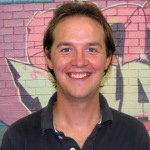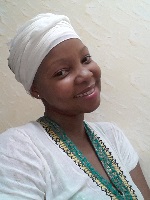Participant Voices
Each year thousands of organizations and civil society activists attend the Commission on the Status of Women. They come from across the world to share their stories and hopes, to exchange ideas, make connections and push for change. Here are some of their voices on what they hope to achieve.
Chi Yvonne Leina (Cameroon)
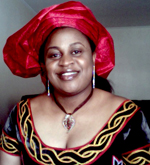
An award-winning Cameroonian journalist and women’s rights advocate, Chi Yvonne Leina is the founder and coordinator of Gender Danger, a grassroots women`s organization that is fighting to end the practice of breast ironing in Cameroon. In 2007, Leina received an award from the Association of Midwives in Cameroon for her extensive reporting on mother and child health. She’s also a winner of the Women Have Wings Courage Awards, 2012– which honours courageous and pioneering women leaders. She will be attending CSW this year as a World Pulse correspondent and on behalf of her own media center for Cameroonian women. She hopes to raise awareness and create partnerships to help her NGO expand its work to prevent breast ironing in Cameroon. “I would like to see greater collaboration between different stakeholders to put an end to heart-wrenching practices like Breast Ironing, female genital mutilation, widowhood rituals, intimate partner violence, etc. It would be wonderful to have follow-up and support of grassroots initiatives that are working to end these practices.” To read Leina’s first-hand account of the practice of breast ironing as part of UN Women’s “In the Words of…” series, click here.
May Louise Mooka (Australia)
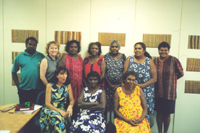
For May Louise Mooka, it all began with her desire to be more than just a number. She wanted to step beyond being just a statistic of domestic violence, and help others do the same. She is of Aboriginal and Torres Strait Islander heritage from Queensland, Australia. As a Community Liaison Officer, she works with 50 indigenous communities to assist in sustainable and culturally appropriate service-delivery and to build relationships with local Aboriginal and Torres Strait Islander communities. “For me this is my way of contributing back to my communities the knowledge and information that I have gained. If I had had this knowledge when I was in my relationship then I would’ve ended it sooner and escaped years of violence” she says. Today her work is her salvation, for which she also received an achievement award from Legal Aid for work on domestic violence and suicide prevention. A first time CSW attendee, she comes to absorb information from all corners of the world and take that back to her community and see how successful strategies can be replicated for them, especially to end violence against women and girls. May comes to CSW through the generous funding of the Yvonne Hebert scholarship.
Elizabeth Gbah (Liberia)
A target group that is not often considered vulnerable and an issue that is not often talked about drives Elizabeth Gbah. “Women receiving higher education in Liberia is increasing gradually and the students are from diverse backgrounds, including poor and rural communities. These students with no economic status normally are denied access to opportunities like scholarships…transactional sex or “Sex for Grades” has been normalized where an instructor will sexually harass female students and nothing is done about it,” she says. Elizabeth is a part of ActionAid Liberia, which is working around the Safe Cities Initiative with a focus on young female students and their safety and mobility. ActionAid is working to change the status quo, through a project on Access to Justice and Support for Survivors of violence against women and girls in South-Eastern Liberia. At CSW, Elizabeth will bring the concerns of these young women, and urge policy-makers to make ending violence against women and girls in public spaces a top priority of the urban development agenda and the post-MDG framework. She hopes the Commission will come up with concrete standards to improve access to justice and support services for women and girls irrespective of status and background, and facilitate more collaboration between northern and southern countries on issues relating to women’s safety and security in public places. After all, she says, a city belongs to ALL – including the most poor and excluded women and girls. ActionAid is supported by the UN Trust Fund to End Violence against Women (UNTF), an inter-agency mechanism established by the UN General Assembly and administered by UN Women on behalf of the UN system.
Rosalina Tuyuc (Guatemala)
Rosalina Tuyuc has worked since the seventies in the fight for justice, peace and respect for the human rights of indigenous peoples, women and other groups, driven by the opportunity for upcoming generations to live in freedom and without violence. Rosalina is co-founder of the women’s organization, the National Coordinating Organization for Widows of Guatemala (CONAVIGUA) and the Political Association of Mayan Women (MOLOJ), and she is an active member of the National Justice Commission. She is currently working with a group of women that suffered sexual abuse/rape and violence during the national armed conflict. From a perspective of the Mayan world view and in collaboration with other organizations, she actively seeks justice in order for the crimes of genocide and crimes against humanity not to go unpunished. Through the National Compensation Programme, she has promoted important efforts to guarantee equal rights and increase compensation for damages caused during the armed conflict in Guatemala.
Beatrice Some Mwimbele (Burkina Faso)
Beatrice is a survivor of female genital mutilation (FGM) who has worked to end this practice through her chapter of the World Association of Girl Guides and Girl Scouts. Her efforts have included a sensitization campaign in some areas of Burkina Faso to spread awareness of the realities of this procedure. She seeks to ensure that survivors of FGM can get medical support, which involves working with hospital systems on access to inexpensive medicine for girls. “It is so important for me to keep fighting for those who have suffered, and to also keep fighting to stop this from happening. Women and girls in my country have started to speak out and I want to help them to have a voice.” Her mission at CSW is to raise awareness and lobby the Government of Burkina Faso to create a new law condemning those who practice FGM. “I am a girl and I want this to stop. I am a Girl Guide and I can help to make this stop,” she says. Beatrice is attending CSW as a delegate for the World Association of Girl Guides and Girl Scouts.
Susannah Sirkin (USA)
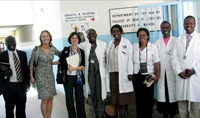
Susannah Sirkin is a senior advisor for Physicians for Human Rights, which works with partners in conflict zones to build a network of first responders—including police, lawyers, doctors and nurses and judges—trained to support survivors of sexual violence. “It inspires me to see how, when these responders come to understand the harm that sexual violence does to women and men, families, and their communities, these professionals become deeply engaged in efforts to not only treat survivors but to document their injuries and promote accountability for the perpetrators,” she says. Her main message at CSW will be the need for a strong, coherent, coordinated movement involving extensive collaboration between professionals, service providers and the grassroots to address the problem of violence against women in all its forms. She believes that only when the social, economic, legal, and political conditions that facilitate sexual violence are seriously and systematically addressed will we start to see a reduction in this violence. “We need to finally solve this scourge, not only to assure hundreds of thousands of survivors that they will get the treatment and justice they deserve, but to offer a brighter future to the next generation – a future where a woman’s body is not a battlefield.” Susannah’s organization is supported by the UN Trust Fund to End Violence against Women.
Tim Shand (South Africa)
A decade ago, Tim Shand’s life changed when he started working as a Rape Crisis Centre volunteer. Today, as the Director of International Programmes for the Sonke Gender Justice Network in South Africa, a UN Trust Fund-supported project, he continues to be motivated by the challenge of advancing women’s rights by working with the many passionate gender justice advocates and leaders within the African continent. His job involves working with individuals, NGOs, Governments and UN agencies across the region to strengthen research, programmes and policies to engage men in challenging gender inequality, and preventing HIV and gender-based violence. “Many men, like myself, seek ways to challenge this violence because of how it damages the lives of the women we care so deeply about, and also casts all men as potential perpetrators. In order to prevent violence against women it is therefore essential to work with men, together with women, to challenge the social norms that can perpetuate gender-based violence, take a stand against this violence and the culture of impunity, and provide alternative and non-violent role models for young men and boys.” He hopes that CSW will end with strong agreed conclusions and include language on the need to focus on prevention, as well as strong punitive responses, and include commitments on engaging men as advocates for change. “There must also be mechanisms agreed to hold Governments accountable for their commitments to ending violence against women.”
Olga Segovia (Chile)
Researcher of SUR Corporación de Estudios Sociales y Educación (Corporation of Social Studies and Education) of Chile, and Coordinator of the Red Mujer y Hábitat de América Latina (Women’s and Habitat Network of Latin America). Olga Segovia is an expert in public spaces, public security, gender, participation, urban development and social housing. During her career she has worked with Chilean institutions such as the National Research and Technology Fund (FONDECYT), the Ministry of Public Works, the Ministry of Housing and Planning, and for the European Union, the United Nations Development Programme (UNDP), UN-HABITAT, UNIFEM, and the Economic Commission for Latin America and the Caribbean. She is currently the Coordinator of the Project, “Colombia, Chile, El Salvador: A new step in the implementation of policies against violence, in coordination with law enforcement institutions. More safety for Women”, with the backing of the UN Trust Fund to End Violence against women, which is an inter-agency grant-making mechanism established by the UN General Assembly and administered by UN Women in the name of the UN system. Olga hopes that the Commission will make progress in public policy guidelines that recognize the distinct forms of violence committed against women’s rights, namely direct, structural and cultural violence, seen in the social, political and economic environments; and that the Commission will debate proposals and initiatives to contribute towards a better coexistence of gender and citizens.
Leentje Kilipi Be’Soer (Papua New Guinea)
Leentje Kilipi Be’Soer works for Voice for Change, a women’s rights non-governmental organization that helps survivors of domestic violence, sorcery-related violence and internally displaced people as a result of tribal conflicts. She is herself a survivor of tribal fighting and domestic violence and has witnessed first-hand the gross abuse of women. She believes that the women’s movement is gaining momentum and that there is important advocacy work being done by organizations, “however we are still far from touching the lives of all women.” Voice for Change is supported by the UN Trust Fund to End Violence against Women, an inter-agency grant making mechanism established by the UN General Assembly and administered by UN Women on behalf of the UN system.
Agnes Leina (Kenya)
Agnes works to bring change in the lives of pastoral communities, especially the women of these communities in Kenya and other countries of East Africa. Through her work with Il’laramatak Community Concerns, and as the gender representative of the IPACC – Indigenous Peoples of Africa Coordinating Committee, she focuses on changing the status of the pastoralist women starting with young girls, and nurturing them through education as the leaders and preservers for tomorrow. Violence against women and girls including Female Genital Mutilation hampers their progress, and Agnes was part of the national working group that lobbied for laws that today outlaw FGM in Kenya. The struggle is far from over against these harmful traditional practices. She says “pastoralist women still suffer from Female Genital Mutilation and all forms of violence against their bodies and souls…we should urge men to join the fight against gender and sexual violence. Time is of essence, more and more pastoralist women in Kenya need to be represented in the UN processes.” She hopes CSW will be the place to voice these issues, and to get various Governments to commit to changing the status of women positively around the globe. Agnes comes to CSW through the generous funding of the Yvonne Hebert scholarship.
Dalí Ángel Pérez (Mexico)
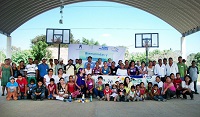
Dalí Ángel Pérez is coordinator of the Commission for Indigenous Children and Youth of the Ciarena Organization for Indigenous Women. It coordinates organizational processes of the Indigenous Youth Network as part of the Alliance of Indigenous Women of Central America and Mexico. As an indigenous advocate, Dalí works with women, youth and girls, providing training, counseling, as well as psychological or legal support for survivors of violence. She works to ensure that community standards of indigenous peoples recognize the rights of women to participate in meetings and influence decisions. She seeks to generate change and longs to transform the reality so many indigenous women live with. Outside of indigenous communities, she seeks to create effective mechanisms to protect indigenous and youth human rights defenders, in keeping with their culture and identity. Dalí is attending CSW as an Yvonne Hebert scholar, a scholarship programme facilitated by UN Women.
Annie Banda (Malawi)
“I am part of them, living positively, I understand what their needs are better and faster than someone who is not HIV+. I have a passion for the HIV+ people especially women and girls. I feel good when I see that their lives have improved I feel very good and want to reach more and more of them,” says Annie, the National Coordinator of the Coalition of women living with HIV and AIDS in Malawi. The Coalition is a grantee of the UN Trust Fund to end Violence against Women for the project “Leveraging Strategies of Positive Action towards Reducing Violence against Women living with HIV. Annie comes to CSW to give voice to the women she works for and with, and to spread awareness on the types of violence faced by women living with HIV. At the Commission she will share the research findings of the study ‘Intimate Partners Violence’ produced by her Coalition, with support of the UNTF. She hopes that the Commission will urge for more involvement of men and male leaders in ending violence against women, and also ensure an end to impunity for the perpetrators of violence against women.
Shimreichon Luithau-Erni (India)
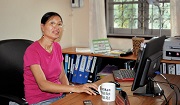
Shimreichon’s motivation comes from the people, the people she meets and works with every day. She is inspired by the indigenous women who work at the grassroots levels, who in spite of the many hardships they face, remain constant—a constant force that nurtures families, the environment, and maintains peace and cohesion in the community. Originally from the Northeastern part of India, she is a member of the tribal grassroots women’s organization – Tangkhul Shanao Long – and a founding member of Asia Indigenous Women’s Network and Naga Women’s Union in Manipur, India. She is currently the programme coordinator of the Indigenous Women Programme of Asia Indigenous Peoples Pact in Thailand. One of the many hats she wears is to oversee a project to strengthen women’s participation in customary governance institutions to address the issue of violence against women and girls funded by the UNTF. She says “indigenous women’s resilience encourages me and at the same time their vulnerability makes me want to work more …to advocate for their rights to their lands, environment and livelihoods resources”. She comes to CSW with the hope that Governments will recognize the multiple forms of discrimination that indigenous women face and put in place systematic ways to consult with indigenous women and men and ensure their voices in decision-making. The Commission, she hopes, will also recognize the critical role indigenous women play in preserving traditional knowledge and sustainable resource management. Shimreichon comes to CSW through the generous funding of the Yvonne Hebert scholarship.
Itumeleng Komanyane (South Africa)
From the age of 13, Itumeleng Komanyane has been working to end violence against women. She began as a peer educator and counsellor working with youth and HIV and AIDS issues in South Africa. “Over time, my passion for social justice grew and my scope of work also developed to include work on youth development, ASRH in Africa, orphan and vulnerable children care and support as well as women and girls’ development. I quickly realised that despite seemingly different interests over time, the common thread was the impact of gender inequalities and how those significantly impacted on everything else.” Her own experience as an African woman a mother and wife continue to fuel her passion for the work that she does. Today she is the Gender-Based Violence Project Coordinator for the Sonke Gender Justice Network. She manages the UN Trust Fund-supported project that seeks to encourage men and boys to take an active stand to end violence against women in Kenya, Rwanda and Sierra Leone. Sonke is part of the Men Engage Alliance, which is a group of NGOs that engages men and boys in effective ways to reduce gender inequalities and promote the health and wellbeing of women, men and children. She says this CSW session should go beyond agreements. “Let it be the one where governments make a commitment, in front of the world, to implement agreed conclusions and begin the process of protecting women and children and working with men to break the clutches of patriarchy in all its forms.”
Sostena Romano (Ukraine)
Sostena Romano has spent nearly 30 years ensuring that HIV-infected women and HIV-infected or affected children have equal and respectful access to services. As Executive Director for HealthRight International, she has witnessed how the most vulnerable are typically the most discriminated against. She works in partnership with community-based organizations and local government institutions, helping to influence the community and support their voices for change. With the support of the UN Trust Fund to End Violence against Women, and in partnership with the Ukrainian Foundation for Public Health, she is working to ensure access to care for women and girls who have experienced violence and are also affected by HIV and homelessness. Women and girls are being engaged through empowerment education and one-on-one counseling to address the violence in their lives and help them set and meet their goals. Men who have perpetrated violence, as well as men and boys who are the partners and friends of female survivors, are being engaged in behaviour-change and relationship-building education, so that they too can be part of the solution and face their own experiences with violence. Sostena believes that it is important not just to empower women and provide services but also to help provide opportunities for their own development. Her purpose in life is to work each day to help shine a light on those most marginalized and ensure that they have access to healthy and hopeful lives.
María de la Luz Estrada (Mexico)
María de la Luz has witnessed the profound pain experienced by the relatives of victims of feminicide to whom the right to truth and justice for their loved ones is frequently denied. With a deep-felt commitment for the defence of women’s rights, she works with the organization, Catholics for the Right to Decide, in the promotion and defence of a life free from violence, and monitoring the administration of justice process in cases of femicide. Her work has had important repercussions in the creation of civic participation groups based on human rights with a gender perspective, seeking to contribute towards access to justice for women victims of violence, femicide and discrimination. Her work has gone beyond Mexico, participating in combined efforts and initiatives in the region, such as the “Campaña Regional por el Acceso a la Justicia para las Mujeres” (Regional Campaign for Women’s Access to Justice), made up of organizations from Guatemala, El Salvador, Nicaragua and Honduras.
Marthe Muhawenimana (Rwanda)
Marte Muhawenimana works for the rights of indigenous women in Rwanda. She has been overseeing gender and education efforts for the Communauté des Potiers du Rwanda (COPORWA). She has worked to increase the participation of indigenous women in the management of public goods and in peace processes. Ms. Muhawenimana has also been part of education monitoring efforts for Batwa girls of Rwanda, in order to develop strategies for advocacy and lobbying.
